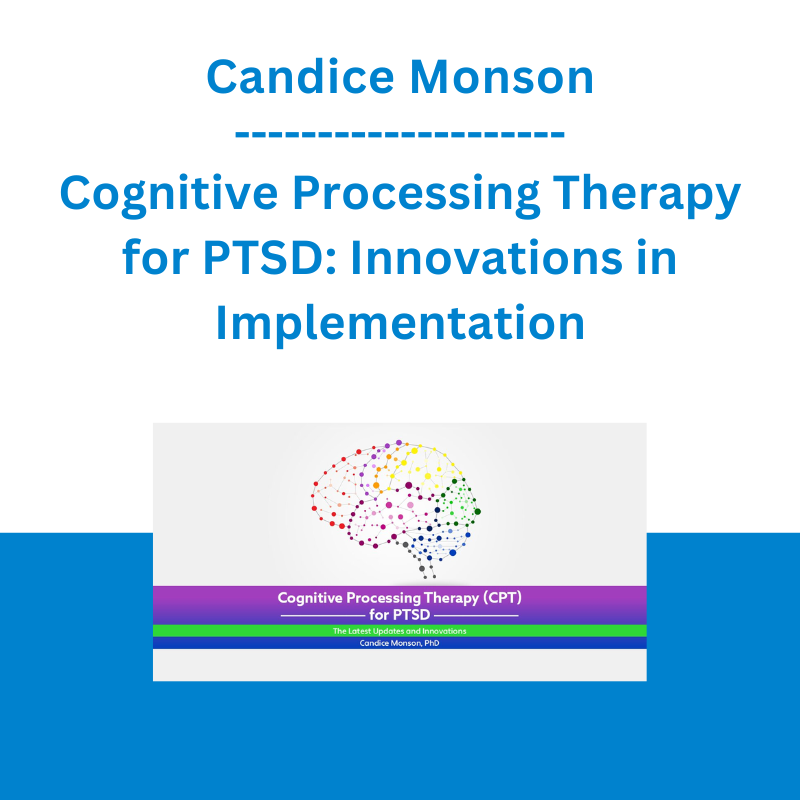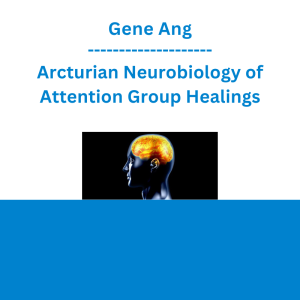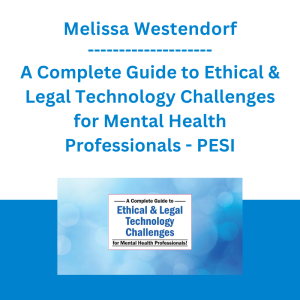*** Proof of Product ***
Exploring the Essential Features of “Candice Monson – Cognitive Processing Therapy for PTSD: Innovations in Implementation”
Speaker:Candice M Monson, PhD
Duration:1 Hour 15 Minutes
Format:Audio and Video
Copyright:Jun 13, 2024
Description
Cognitive Processing Therapy (CPT: Resick, Monson, & Chard, 2017) is one of the front-line recommended therapies for PTSD recommended in multiple treatment guidelines globally. CPT is a short-term, trauma-focused therapy that is comprised predominantly of cognitive interventions. CPT has four primary phases, including: 1) Providing psychoeducation about PTSD from a cognitive perspective; 2) engaging in cognitive-behavioral self-monitoring; 3) implementing cognitive interventions that target trauma appraisals; and 4) addressing overgeneralized beliefs stemming from traumatic experience.
In this presentation, participants will have the opportunity to explore various aspects of CPT and the data that supports its effectiveness. The theoretical foundations that inform personalized case conceptualization for individuals with a range of multiple traumas and diagnoses will be presented. A demonstration of Socratic dialogue using video-recorded materials from a real case will be shown, and major updates included in the new edition of the manual to be released April 2024 will be reviewed. Innovations in the delivery of CPT, including intense dosing, personalized length, MDMA-and psilocybin-assisted CPT, and delivery to individuals with comorbid PTSD-BPD will be described for discussion.
Speaker
Candice M Monson, PhD
Candice Monson, PhD, is Professor of Psychology at Toronto Metropolitan University. She is one of the foremost experts on traumatic stress and the use of individual and conjoint therapies for PTSD. Dr. Monson has received numerous awards for her clinical, teaching, and research contributions, including Fellow status in the Canadian and American Psychological Associations and Association of Behavioral and Cognitive Therapies, and induction into the Royal Society of Canada. Dr. Monson has published over 170 peer-reviewed publications and co-authored 8 books, including the treatment manuals Cognitive Processing Therapy: A Comprehensive Manual and Cognitive-Behavioral Conjoint Therapy for PTSD. Dr. Monson is well-known for her clinical training and therapy dissemination efforts.
Speaker Disclosures:
Financial: Candice Monson has employment relationships with Nellie Health and Toronto Metropolitan University. She receives compensation as a consultant. Candice Monson receives royalties as a published author. She receives a speaking honorarium from PESI, Inc. She has no relevant financial relationships with ineligible organizations.
Non-financial: Candice Monson is a member of the Ontario Psychological Association and is a fellow with the American Psychological Association, the Canadian Psychological Association, and the Association for Advancement of Behavior Therapy.
Objectives
- Articulate the theory supporting Cognitive Processing Therapy for PTSD
- Describe the evidence base supporting Cognitive Processing Therapy for PTSD and commonly comorbid conditions.
- Identify CPT Strategies that can be applied to participant’s clinical practice
Outline
Prevalence and understanding of trauma as transdiagnostic risk factor
- high prevalence of traumatization
- trauma associated with a range of psychopathology
- PTSD one of the resulting conditions
Overview of treatment efficacy of PTSD treatment and limitations of the research
- Trauma-focused therapies as front-line treatment
- Relative efficacy of other conditions
Theory underlying CPT
- Concept of trauma recovery (Monson et al., 2021; Riggs et al., 1995; Rothbaum et al., 1992)
- Impediments to recovery according to theory to be targeted
- Cognitive theory
Overview of CPT protocol
Efficacy and effectiveness trials supporting CPT (Resick et al., in press)
- PTSD outcomes
- Comorbid outcomes
- Predictors and mediators of change
- Risks and Limitations of the Research
Future Directions for Research
- Comorbid PTSD-BPD
- MDMA-facilitated
- Psilocybin-facilitated *(speaker not going into the procedures to use psychedelics. Will be reporting at a high level that these are the studies that are being done to facilitate the outcomes and tolerability of CPT)
- Accelerated delivery in controlled trials
Target Audience
- Licensed Clinical/Mental Health Counselors
- Marriage & Family Therapists
- Psychotherapists
- Psychologists
- Social Workers
Please see the full list of alternative group-buy courses available here: https://lunacourse.com/shop/










 Matthew Kratter - Trader University
Matthew Kratter - Trader University  The Daily Traders – Exclusive Trading Mentorship Group
The Daily Traders – Exclusive Trading Mentorship Group  Chris Capre - Advanced Price Action Ongoing Training & Webinars
Chris Capre - Advanced Price Action Ongoing Training & Webinars  Gary Kraftsow - Dissolve the Knot of the Heart & Connect to the Divine With Tantric Laya Yoga - The Shift Network
Gary Kraftsow - Dissolve the Knot of the Heart & Connect to the Divine With Tantric Laya Yoga - The Shift Network  Gene Ang - Arcturian Neurobiology of Attention Group Healings
Gene Ang - Arcturian Neurobiology of Attention Group Healings  Ed Ponsi - Forex Trading
Ed Ponsi - Forex Trading  Abu Fofanah - Power Your Launch Marketing Accelerator 2.0
Abu Fofanah - Power Your Launch Marketing Accelerator 2.0  Sovereign Man Confidential - Renunciation Video
Sovereign Man Confidential - Renunciation Video  Melissa Westendorf - A Complete Guide to Ethical & Legal Technology Challenges for Mental Health Professionals - PESI
Melissa Westendorf - A Complete Guide to Ethical & Legal Technology Challenges for Mental Health Professionals - PESI  Oliver Velez - Essential Strategy Of Trade For Life
Oliver Velez - Essential Strategy Of Trade For Life